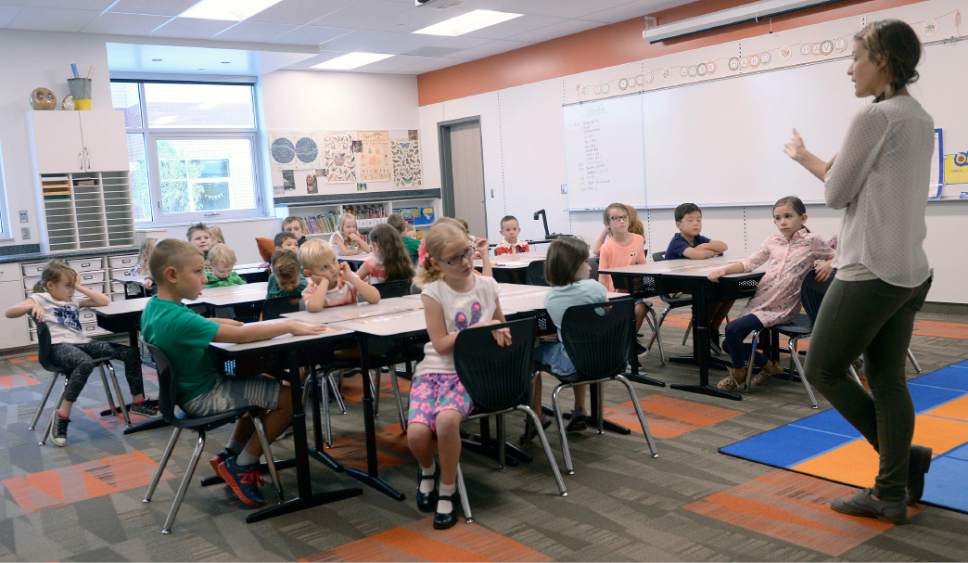This is an archived article that was published on sltrib.com in 2016, and information in the article may be outdated. It is provided only for personal research purposes and may not be reprinted.
With less than a month before Election Day, the battle lines for the Utah Board of Education have been drawn.
In an email to its members Thursday night, the Utah Technology Council encouraged support for a slate of candidates diametrically opposed to that of the Utah Education Association, formalizing an anti-UEA narrative that has persisted throughout the campaign season.
School board candidate and Utah Technology Council President Richard Nelson said the email does not constitute a formal endorsement because it originated in the council's Public Policy Forum, an informal vetting group composed of business leaders, lawmakers and their "friends."
He said the sole criteria determining the forum's support was whether a candidate had received money from the UEA.
"The six candidates that are independent candidates really ought to be pulled together," he said, "and the six that have received [National Education Association] money."
Eight school board candidates were listed in the council's email: incumbents Dave Thomas and Stan Lockhart, as well as Nelson, Shelly Teuscher, Gary Thompson, Lisa Cummins, Alisa Ellis and Michelle Boulter.
The Utah Education Association has given in-kind campaign donations to candidates Jennifer Graviet, Janet Cannon, Carol Barlow-Lear, Kathleen Riebe, Erin Preston, Wesley Christiansen and incumbent Dixie Allen.
The Utah Technology Council is a professional organization for the state's technology industry. Its email touted the work of the technology council in electing school board members over the past decade who support workforce training for students and STEM education programs, an acronym for science, technology, engineering and math.
But those efforts are threatened, the email stated, by local and national teachers unions.
"A Washington, D.C., special interest group, the National Education Association (NEA), has funneled large amounts of money through the UEA to directly influence six races that oppose our efforts," it said.
Disclosure forms show the Utah Education Association receiving $300,000 in June from the NEA Fund for Children and Public Education, among other contributions. The UEA spent roughly $200,000 on advertisements for Utah Gov. Gary Herbert during the primary election, and made a series of in-kind contributions of between roughly $9,000 and $15,000 to state school board candidates.
UEA President Heidi Matthews said Utah teachers chose which candidates to support.
"There is a significant fear among teachers that some members of our State Board of Education are more focused on business interests than on doing what's best for students," Matthews said. "When we as teachers see the board passing rules and policies that negatively impact our classrooms and our profession, we feel a moral obligation to get involved."
The criticisms of UEA spending were publicly raised in September by Senate President Wayne Niederhauser, R-Sandy, during a webinar that included the Utah Technology Council and the School Improvement Network.
At the time, Niederhauser identified Thompson, Cummins, Ellis and Boulter as "Anti-Common Core" candidates, and expressed his support only for Thomas, Teuscher, Nelson and Lockhart.
Several candidates said Friday that they were surprised by the Public Policy Forum's support, having never been contacted or interviewed by the Utah Technology Council.
"I have never sought or received an endorsement from UTC," Thompson said in an email to the Salt Lake Tribune. "In fact, I have never attended a meeting of UTC or have been approached by any representatives of UTC."
The so-called "Anti-Common Core" candidates also favor policy positions that contradict Utah Technology Council priorities. In interviews with The Tribune and in public statements, they have criticized Utah's use of school grading, standardized testing, student data collection and a statewide focus on workforce and career training.
"I am not anti-technology," Boulter said. "I think it can definitely enhance the classroom. However, it shouldn't be used as the primary source for educating our children."
The technology council's email also identified male school board candidates by their professional backgrounds, while identifying the female candidates as "Parent, Wife and Mother."
Teuscher, director of government relations for the law firm Parsons Behle & Latimer, laughed when asked about the gendered designations, but declined to comment.
"I noticed it," she said. "That's all."
Barlow-Lear, who is running against Teuscher in the board's 7th District, said she would have welcomed an opportunity to pitch her candidacy to the technology council. She said the council appears to be making generalizations about the candidates supported by the teachers union.
"I very much support technology education, engineering, math," she said. "Of course I do."
And Riebe, who is opposing Thompson in District 10, said she holds a technology endorsement and works with classroom technology in her current position within Granite School District.
"I don't know why they're afraid to have teachers on the state school board," she said.
Twitter: @bjaminwood



